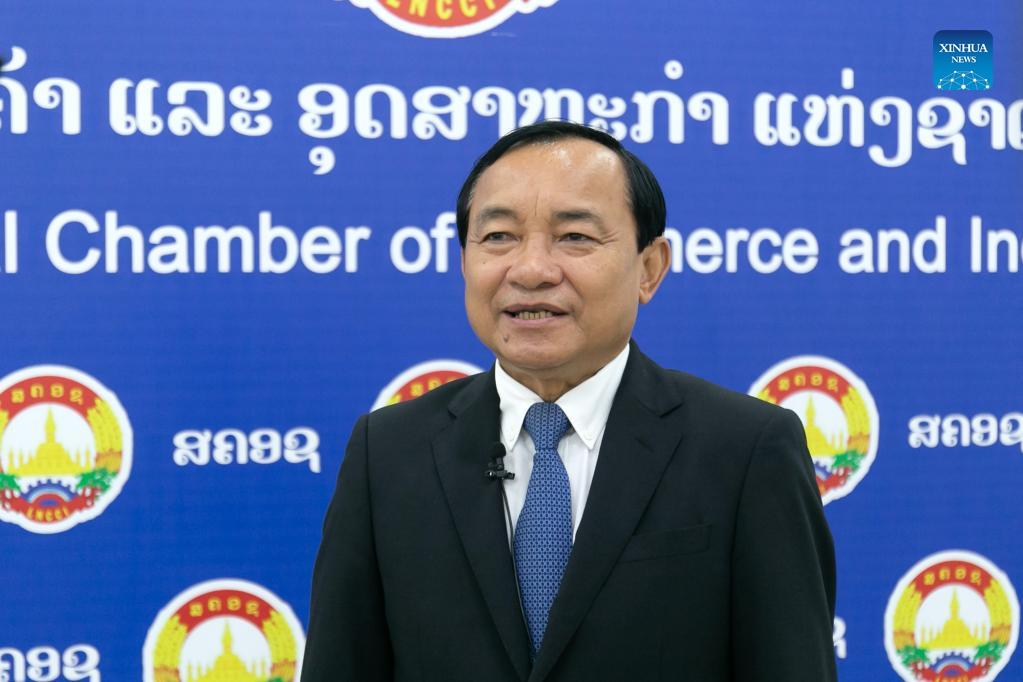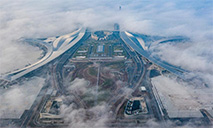Interview: RCEP brings new economic opportunities to region, says Lao business leader

Daovone Phachanthavong, the vice executive president of the Lao National Chamber of Commerce and Industry, speaks in an interview with Xinhua in Lao capital Vientiane, Jan. 7, 2022. (Photo by Kaikeo Saiyasane/Xinhua)
By Chanthaphaphone Mixayboua, Zhang Jianhua
VIENTIANE, Jan. 8 (Xinhua) -- The Regional Comprehensive Economic Partnership (RCEP) agreement, could bring great economic development opportunities to the region, and the agreement is very beneficial for Laos, said Daovone Phachanthavong, the vice executive president of the Lao National Chamber of Commerce and Industry (LNCCI).
Being part of the agreement would provide more market opportunities for Laos to expand production for export and promote the tourism sector, the LNCCI official told Xinhua in an interview here on Friday.
"Laos is very fortunate to build a community with a shared future with China and sign the RCEP agreement," said Daovone.
"With the opening of the Laos-China Railway, Laos has become an important node on the China-ASEAN land corridor. The lion's share of the railway transportation of goods between China and ASEAN will pass through Laos, which can greatly promote the economic development of Laos."
RCEP, taking effect on Jan. 1, groups 10 ASEAN members namely Brunei, Cambodia, Indonesia, Laos, Malaysia, Myanmar, the Philippines, Singapore, Thailand, and Vietnam, as well as Australia, China, Japan, New Zealand, and South Korea.
The entry into force of RCEP has provided Laos with the best cooperation opportunities in terms of personnel exchanges and business exchanges, and deepened the interconnection between Laos and other ASEAN member countries.
Daovone said, "RCEP and the Laos-China Railway can effectively reduce the cost of commodity trade. It will help support our economic growth by stimulating new investment and providing greater market access for Lao products. More and more commodities from Laos can be exported to other ASEAN countries."
Daovone has been engaged in the business of logistics and trade with Chinese companies since 2002 and his business has expanded to more than 10 industries so far.
"After the agreement takes effect, it can reduce intra-regional trade costs and transportation prices. The cost of our export products is much lower than before," said Daovone.
"RCEP can also bring more employment channels to the people in the region."
Laos-China Railway has transformed Laos from a land-locked country into a land-linked country, through which the country has achieved interconnection with China, Thailand, Cambodia, Vietnam and other countries, said Daovone.
Meanwhile, RCEP, covering nearly a third of the world's population and gross domestic product, is a mega trade pact that aims to break down trade barriers and promote investment.
"I believe that the ASEAN economy will definitely have better development in the future," said Daovone.
Photos
Related Stories
- Interview: RCEP offers new economic opportunities for inclusive, balanced growth -- Malaysian business expert
- Interview: RCEP to boost ASEAN's post-pandemic economic recovery, says Malaysian analyst
- Malaysia's durians, other agricultural exports to see boost under RCEP trade agreement
- RCEP officially enters into force on first day of 2022
- Openness and integration are an unstoppable trend of history
- RCEP fuels new hopes for region's growth
- South China's Hainan issues first RCEP Certificate of Origin
- RCEP rollout a major victory for multilateralism, free trade: FM spokesperson
- Exporters already see RCEP wins with trade
- Trade between China's Guizhou and RCEP members up 22.7 pct in first 11 months
Copyright © 2022 People's Daily Online. All Rights Reserved.










